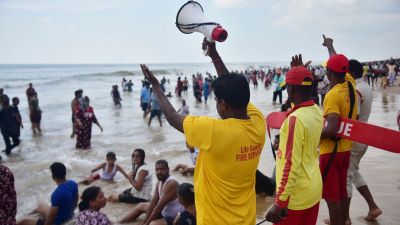Renewed carnage in Kosovo, fears NATO
BELGRADE, MARCH 27: NATO today said all its warplanes had returned safely from a third night of bombing raids on Yugoslavia, but fears gr...

BELGRADE, MARCH 27: NATO today said all its warplanes had returned safely from a third night of bombing raids on Yugoslavia, but fears grew that the air strikes had provoked a fresh Serb bloodbath against Kosovo Albanians.
British Defence Secretary George Robertson said some Kosovo villages had been wiped out in the latest Serbian onslaughts.
“We have heard that some villages do not exist,” he told a news conference. “There are clear signs that an all-out offensive has started.”
In its fiercest bombardment yet, NATO hit targets so close to Belgrade that residents could see Tomahawk cruise missiles flying overhead.
The raids were meant to stop Yugoslav President Slobodan Milosevic from waging his year-old war against majority ethnic Albanians in Kosovo.
But NATO acknowledged the Serbs appeared to have stepped up ethnic slaughter in the southern province.
“There is mounting evidence from a number of different sources now that terrible things are happening in Kosovo,” NATO spokesman Jamie Sheasaid. In the latest of several unconfirmed massacre reports, Kosovo Liberation Army (KLA) sources said Serb paramilitary gangs had slaughtered several hundred ethnic Albanians in the Kosovo town of Djakovica after NATO bombed a local barracks.
“They’re telling us that about 70 bodies were found in just two houses, but hundreds were killed all over town,” Kosovo Albanian sources in touch with the KLA guerrillas said.
Albania’s interior ministry said Serbian artillery had pounded several ethnic Albanian villages in Kosovo last night and villages in Djakovica district were ablaze. Serbian ally Russia called the NATO campaign a dark chapter in history but said it would not let itself be sucked into a Balkan war.
The Kremlin said President Boris Yeltsin had sent Milosevic a letter supporting the Yugoslav people and condemning the NATO air strikes. The Russian parliament was to hold an emergency session on the crisis.
Huge orange flashes illuminated the night sky over Belgrade as missiles hit targets inthe southern suburbs including a rocket fuel depot, residents said.
The capital’s streets were almost deserted at mid-morning, and shops remained shuttered.
Serbian television said NATO’s warplanes were “picking targets and destroying an independent and legal state, it is not up to us to feel ashamed, but to feel proud of our unity and courage.”
The official Yugoslav news agency Tanjug reported that six missiles were fired at an airfield near Podgorica, the capital of Montenegro, which along with Serbia makes up the Yugoslav federation.
The Pentagon said that after damaging air defences in Yugoslavia, NATO was increasingly shifting the focus of its attacks to army and police units operating in Kosovo, which has a 90 percent ethnic Albanian majority.
`Alliance planes safe’






- 01
- 02
- 03
- 04
- 05

























